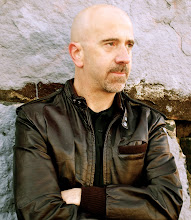In a perfect world,
- Authors and publishers would rewrite, edit and proofread their work a lot.
As many times as it takes to produce clean, sharp prose with as few typos, formatting errors, and printing mistakes as possible. You owe that to people spending their hard-earned money on your product.
- Readers would understand mistakes happen.
We're all human, errors are unavoidable, at least until the machines become self-aware and take over the writing and publishing of all books for us. Then everything will be perfect, right? Boring as hell, but perfect.
- Authors wouldn't be so damned whiny and protective of their work.
You got a one-star review, suck it up and live with it instead of complaining to anyone who'll listen on Facebook and Twitter about the unfairness of it all. Not everyone's going to dig what you wrote; that's been the case with the most highly-regarded authors ever, it's certainly going to be the case with me and you.
- Readers wouldn't be so quick to blister authors with their keyboards simply because they can.
Authors live and die by reviews, sales - and reputations - are to no small degree based on them, and to attack an author in a hurtful way simply because you disagree with his politics or the way she markets and promotes her work is just wrong.
- Traditionally published authors would stop treating Indies like gum stuck to the bottom of their shoes.
The world of publishing remained unchanged for five centuries. Now, in the space of half a decade, all that is history, and whether you like it or not, things are never going back to the way they used to be. Sneering at Indie work doesn't make you look superior, it only makes you look petty and vindictive, not to mention out of touch.
- Indie authors would stop thumping their chests and jumping up and down about how wonderful their method is compared to traditional publishing.
Most of the authors published traditionally worked damned hard to get where they are, just like you did. In many cases they endured years, sometimes decades, of rejection before signing that trad contract. Can you blame them for being a little resentful of you, especially if you brag about rushing a book to market in three weeks or something equally ridiculous? Try to act like a professional, for crying out loud.
- All authors would take a moment to appreciate how lucky we are.
Whether you've written a NY Times bestseller or you're having trouble convincing anyone besides Mom to read your book - or, like most of us, you're somewhere in-between - take a second to smell the coffee, baby. You're doing what you love, and how many people can say that? How many people have the opportunity to touch potentially thousands of other people with their words, to make them laugh or cry or get angry, to focus their attention on an issue or a problem, to entertain them?
Not very freaking many. You're a writer, man, enjoy it. Okay, that's enough enjoying it. Now get back to work.
The continuing adventures of one man's quest to achieve publication, validation, and money-make...shun...
Friday, June 15, 2012
Subscribe to:
Post Comments (Atom)















5 comments:
All good advice, Allan. But especially the last one. It's such a whirl, but there are reasons to celebrate every stage. Writing and rewriting. Coming up with the cover. Marketing. Seeing your book up there for the first time. Whatever lists you get on (and these days, with KDP Select, you're bound to get on some of them) and most of all, the idea that on whatever level, you did it! You're living the dream.
Right on, Maggy - it seems so self-evident, but it's also so easy to lose track of how cool it is. I can entertain people across the country and around the world, people I've never met and never will meet, with the product of my mind. It's awesome and scary and definitely exciting.
In a perfect world, doing what you love would always equal making enough to live off of. ahh...life.
-evega
Good addition, and unfortuntely, only a small percentage of authors are at the point where writing is all they need to do to support themselves. On the other hand, if you're willing to put the work in and treat writing like a second job, the possibility always exists...
All excellent points. Instead of worrying about who's right and who's wrong, both sides need to step back, stop judging each other and be thankful. Amen.
Post a Comment